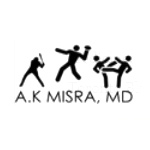Health Tips brought to you by U.S. HealthWorks Medical Group. Our experienced medical experts provide information here that we hope will broaden your health care knowledge.
Today we talk with Dr. A.K. Misra, medical director for U.S. HealthWorks in South San Francisco, about the rise in allergies in the U.S. Dr. Misra is double-board certified in Sports Medicine and Internal Medicine.
Q: I keep hearing about allergies of all sorts recently, ranging from peanuts to dust to cats. Have allergies become more common? What should we think about all of this?
A: From an epidemiological standpoint (meaning the area of medicine that studies diseases in large populations), yes, both incidence and prevalence of diagnosed allergic disorders is higher than it used to be, and is apparently on the rise. The reasons for this are complex and, in some aspects, even debatable. One potential factor is that here in the U.S., our microbiome is being altered to our disadvantage.
The normal ratio of colonized bacteria to us – on a cellular level – is approximately 10:1, and is supposed to be so. However in America, due to our frequent use and misuse of antibacterial soaps, hand sanitizers and antibiotics (both in clinical practice and in factory farming by way of meat and dairy production), this ratio has been disrupted. Some in the medical and science communities hypothesize that this disruption is in part (if not significantly) behind this rise in allergies we are seeing nationwide. This is why being born and raised in the U.S. appears to portend to a higher likelihood of having allergies than being born in other countries.
Interestingly, this is also why it is thought that the Amish community tends not to have as many allergies due to their lifestyle, which is essentially independent of antibiotics and the cleaning procedures that many Americans practice.
Today, we as doctors are better able to diagnose allergies than we were in the past thanks to the development of specific testing procedures.
Q: What are the signs that I might have an allergy?
A: There are different types of allergic reactions ranging in severity, categorized as Types I to IV. Type I is the most severe and potentially lethal. It is for this type of reaction (anaphylaxis) that epinephrine, which most people know under the commercial name of EpiPen, is administered as a life-saving effort. Even if the intervention is successful (and it may not be), the patient must still be transported to the emergency department for intense observation and care because they may not be safe upwards of 24 hours post-exposure to the offending allergen (i.e. bee sting, almonds, etc).
Less severe allergic reactions commonly include over-active sinuses and related post-nasal drip (i.e. allergic rhinitis) and skin rashes. The take-home point is that if you suspect you may be having an allergic reaction of any type, you must seek medical attention immediately as true allergic reactions can have unpredictable courses, especially the first time around.
Q: What are some ways to reduce the likelihood of developing allergies?
A: At a recent scientific meeting (ACP – American College of Physicians, Internal Medicine) I attended, a Board Certified Allergist shared data that children who were raised or spent considerable time with ruminants (four-legged mammals) had a much lower incidence of allergies. This may be why Amish communities tend to have a lower incidence of allergies compared to the rest of the U.S. population, as touched upon earlier. Further, especially in America, the excessive use of hand sanitizers, anti-bacterial soaps and overuse of antibiotics (directly and in factory farming in the form of meat and dairy) is killing off friendly and helpful bacteria. Simple soap is more than enough for good hygiene. To that end, Minnesota was the first state to place a ban on antibacterial soaps. Additionally, the FDA explains that antibacterial soaps have not been proven any more effective at killing germs or preventing illness.
Note that one of our recent blogs highlights when to use antibiotics – which may be useful in this discussion.
Q: What if you don’t know if you are allergic to certain things, or if allergies run in the family, or otherwise?
A: At U.S. HealthWorks, both in our Occupational Medicine and Urgent Care services, we are not always certain if a patient in our care should be further evaluated for an allergic reaction, or if we are dealing with a primary skin disorder. To help address this, we may send a patient for something called “patch testing” to help diagnose if the patient is explicitly allergic to a specific allergen such as shellfish, pollen, etc. This information can be quite useful to both the patient and physician in managing their health.
Q: What are some things I can do to help reduce my potential of having allergic reactions or getting allergies all together?
A: This is always a difficult question to answer, however falling under the “do no harm” criterion, I believe these are some simple, sensible, and above all safe, things to do.
Another interesting fact I’ve learned is that consumption of dates can provide some protective effects against allergy-oriented problems as well.








